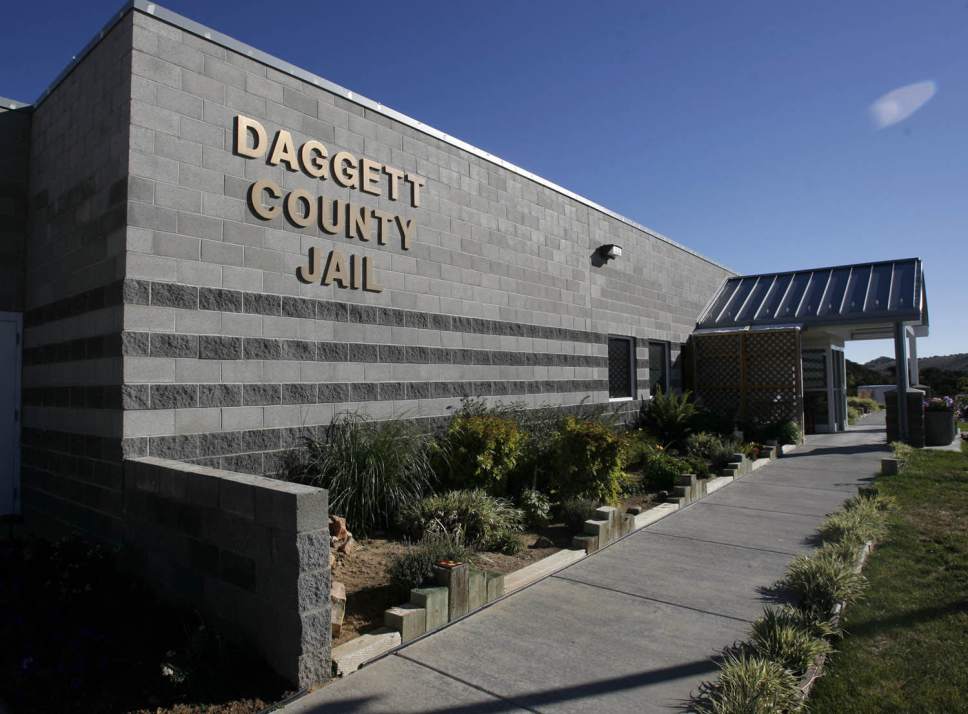This is an archived article that was published on sltrib.com in 2017, and information in the article may be outdated. It is provided only for personal research purposes and may not be reprinted.
Daggett County's jail has remained empty — a consequence of employee misconduct — for so long that officials are wondering whether it makes sense to reopen it, even though it has been a large local employer in the state's least populous county.
The state for years paid the county to house its prisoners. The Sheriff's Office in turn hired residents from the county of about 1,100 on the Wyoming border, where people typically find work with the government, ranching or serving tourists visiting Flaming Gorge.
After a corrections officer allegedly used a stolen stun gun on inmates and later used the county's new K-9 for illicit training, the Department of Corrections opened an investigation, removed its inmates and stripped Daggett County of an anticipated $1.42 million through the end of the year.
"Right now we're at a stage of when or how or if we can make it work," Commissioner Jack Lytle said.
Daggett County is weighing three options, each with its own uncertainties. It can rent its jail to Salt Lake County, which is strapped for jail space and has state and county money to send up to 300 inmates to other parts of the state. It can look for ways to hire back employees and hope the Department of Corrections decides to once again send inmates. Or it can move forward without a money-making jail.
"We're just in a bad place," said Susie Potter, the sheriff's spokeswoman. "This has been financially devastating to the entire county, not just the jail budget."
The Department of Corrections in February removed about 80 inmates and the $52 per day funding for each inmate housed at the jail, after an investigation showed two people were bitten by police dogs and inmates were stunned with Tasers wielded by a corrections officer. The department also accused the county of other mismanagement at the jail.
The sheriff's office hoped the state would return inmates after several employees and former Sheriff Jerry Jorgensen were hit with criminal charges in early May.
The county feared at the time it would struggle to rehire employees if they were laid off, as even the state's largest, urban counties have a difficult time attracting corrections officers. The commission transferred $120,000 from its general fund, and the sheriff's office had its employees spend their time keeping the empty jail in good working order.
Then, the commission found a helping hand from Uintah County Sheriff Vance Norton, who took on several Daggett County sheriff's employees as Uintah needed officers. That hit a dead end in mid-June, when Norton found full-time hires and no longer needed outside help, Potter said.
Daggett County has since laid off seven or eight jail employees, setting up the painful conundrum it sought to avoid.
"We need inmates for income to hire employees," Potter said, "but we don't have money for employees needed for inmates."
Maria Peterson, a spokeswoman for the Department of Corrections, said the agency is talking with Daggett, but that "at this time the county does not have enough corrections staff to adequately operate the jail."
The employee shortage comes at a time when Salt Lake County is looking for space to house up to 300 inmates from its crowded jail. That county is considering renting the jail and staffing it with its own employees, Potter said.
Even with the prospect of revenue and staff from Salt Lake County, the county's woes have attracted the attention of Gov. Gary Herbert. His office is working with legislators to see whether they can help attract jobs to one of Utah's most remote counties.
"Daggett County is really an idyllic, beautiful place to live. But it's a ways away from the amenities that some employers need," said Mike Mower, Herbert's deputy chief of staff.
State data show residents rely heavily on jobs from the county, state and federal government. As the unemployment rate in Utah dropped from 2014 to 2015, it ticked up in Daggett County, to 4.6 percent, according to the most recent data from the state Department of Workforce Services.
"We're very concerned about the economic impact that it's going to have on the community," said Rep. Logan Wilde, R-Croydon. "We've just been back and forth trying to brainstorm some ideas about how to best benefit that county so that they don't have economic downfalls within the community."
Twitter: @TaylorWAnderson



